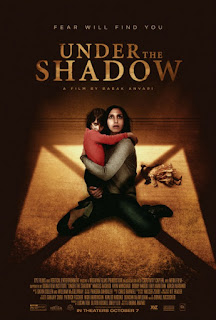Set amidst the Iran-Iraq conflict in the 1980s, we meet the world-weary Shideh (Narges Rashidi) and her daughter Dorsa (Avin Manshadi) as they cope with the turmoil and daily blasts in war-torn Tehran. One day, a missile crashes into their apartment complex (an image that evokes Guillermo del Toro's brilliant The Devil's Backbone). Soon after, Dorsa's behavior shifts and she begins speaking of an evil and possessive wind spirit called Djinn. Shideh stays in skeptic and denial mode, but when she witnesses some frightening occurrences herself, she realizes it's not just a child's imagination.
While most of Under the Shadow's fears thrive on anxiety and dread, there are still a couple of shocking jump scares that nearly caused my heart to leap out of my chest. Along with its alarming sequences of startles, the film is so engrossing because it's rooted in solid drama, doused in sociopolitical overtones of Iran's post-revolution stresses (especially for women), and focused on sympathetic and well-drawn characters. It's very human, and it's a great mother and daughter story against hostile circumstances. The film has a slim runtime of 80 minutes, leaving little room for filler or empty scenes. Every drab frame is precisely rendered, and the ominous mood is crafted with unnerving sound design and backed with an eerie musical score that stuns and reverberates.
Under the Shadow casts darkness on an ill-omened intrusion. A potent and lingering fear. A devastating hole that tape won't fix.
* 9/10 *
Be sure to Like Fade to Zach on Facebook!
And Follow me on Twitter: @Fade_to_Zach














